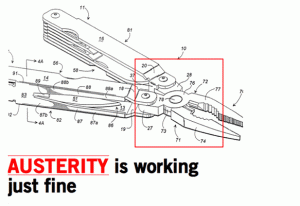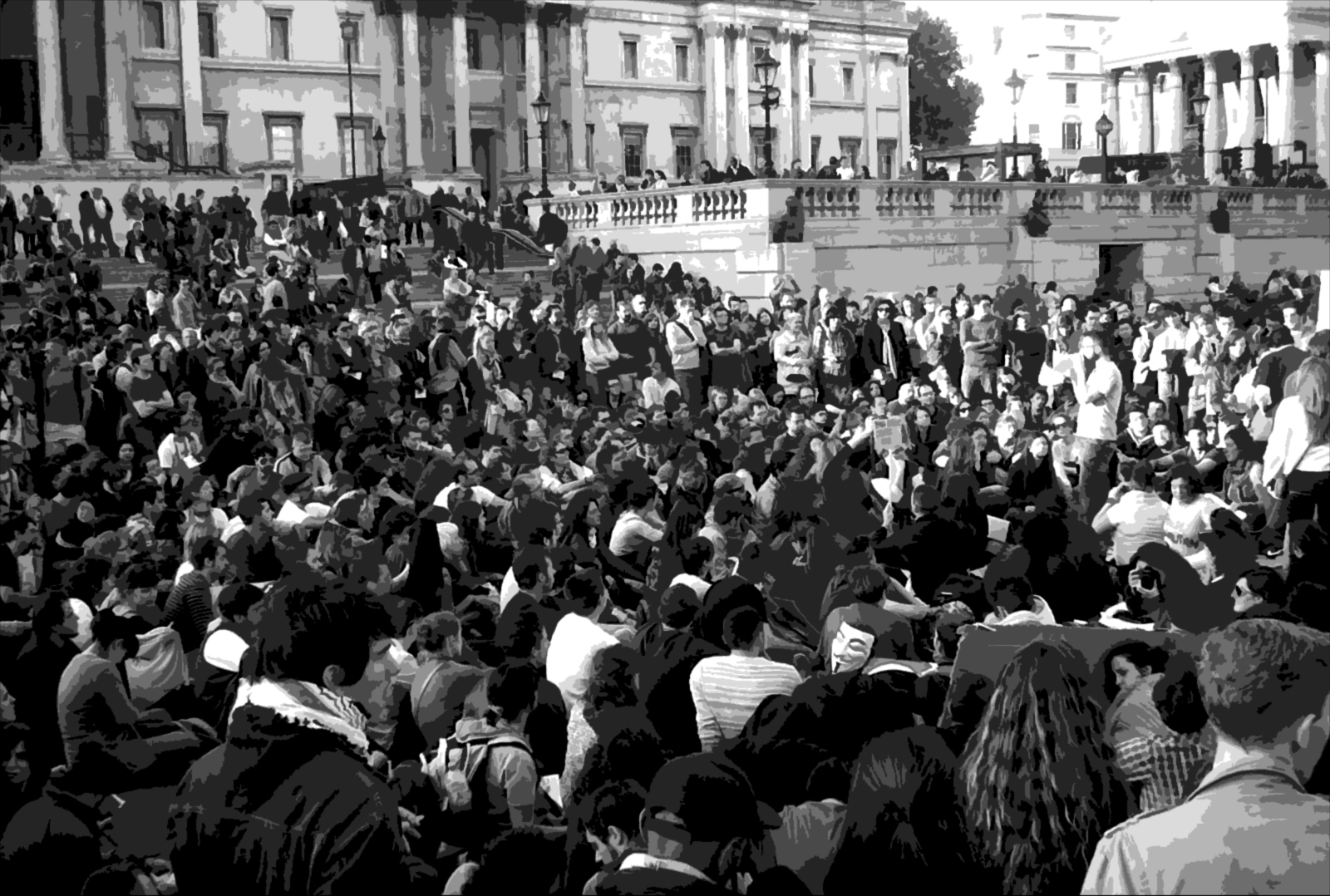Part one of the publication that Plan C distributed in London on the October 20th TUC March.
Change in the air
There was a brief period, back in 2008, maybe 2009, just after the financial crisis first erupted, when it seemed like some sort of radical change might be possible. It was obvious to all that the banks and other financial institutions had become bloated on their own profits. It was obvious to all that the story they’d spun about their contribution to human well-being was just that — a story.
With banks and those who ran them in the stocks, sitting on the naughty step, there was a sense of openness, a sense of possibility, a sense that it might just be possible to rein in the power of the financial markets and to re-establish what some people called ‘a real economy’ – one based on making things and not just the flashing of numbers across computer screens. The fervour was far from revolutionary. Many of those criticising finance and the havoc it can wreak were wholly respectable, establishment types. But nonetheless, there was a whiff of change in the air.
Of course, things didn’t turn out that way. Financial institutions were rescued with taxpayers’ money — £850 billion of it (the equivalent of £14,000 from each person in the country and enough to fund the NHS for almost a decade). There was no rescue for mortgage holders and other ‘ordinary’ debtors: they were left to sink. Nor any rescue for those people whose jobs were being lost at phenomenal rates. Banks were supposed to use the public bail-out money they’d received to increase their lending and thereby to ‘reboot’ the economy. Instead they tightened lending even further and used the money to pay themselves huge bonuses. And so the ‘trickling down’ of wealth from rich to poor was reversed as money, more money than it’s possible for most of us to even conceive, flowed uphill. Far from attempting to ‘fix’ the crisis, what instead happened was one massive transfer of wealth from poor to rich – a transfer almost unprecedented in history. Almost overnight a banking crisis become a sovereign debt crisis, as public finances were pillaged by the already super-rich and what was left of the welfare state was privatised.
Same old, same old
Now — or so we are told — it is Britain’s public finances that are bloated, its public (or ‘sovereign’) debt that is ‘excessive’. The fragile British economy cannot carry the weight of this debt and so it must be reduced. And, to do this, public spending must be cut. Slashed. But what’s ‘excessive’? In 2011 the UK’s sovereign debt was roughly £900 billion, or 60% of its annual GDP — the amount of economic value produced within its borders. Is that ‘excessive’? In 1946, emerging from the Second World War, Britain’s public debt as a proportion of annual output was four times this: debt was almost 240% of GDP. Yet Britons went on to create the national health service, a system of universal benefits, new schools and universities which were free to all: the welfare state that was designed to take care of us from ‘cradle to grave’.
No, Britain’s public debt is ‘excessive’ because the financial markets say so; this is what the markets ‘think’. Of course, the ‘financial markets’ do not really say or think anything. The financial markets, like all markets, are just an abstraction, a social institution through which human beings interact — and, as is brutally clear, influence other humans’ lives and livelihoods. (Let’s remember that these humans, the ones who are speaking for the financial markets, are in many cases are the very same people whose skins we saved with that £850 billion of bailout money).
If cuts are not made, if austerity isn’t imposed and accepted, then Britain — or so we are told — could go the same way as Portugal, Italy, Ireland, Greece, Spain — the so-called PIIGS, the basket cases of Europe.
The problem isn’t that Britain has too much debt, but that those faceless people running ‘the market’ have decided that the financial returns to be made by investing their money in the UK isn’t high enough. To get a good rate of return, they want less state spending, lower wages, worse working conditions and less ‘red tape’. They want a free hand.
How did we end up here?
The press tell us that this crisis is the product of an asset bubble and excessive greed — greedy bankers who believed their own hyperbole and awarded themselves bonuses to match, and populations who thought that they too could get something for (almost) nothing, remortgating houses, maxing out credit cards and buying stuff on the never-never.
Like any lie, this story has a grain of truth to it. ‘Excessive greed’ is a very poor explanation, as are tales of lax morality and individual excess. The whole system — capitalism — is driven by greed and ‘greed is good’. When did greed suddenly become bad? The real story’s complicated and hard to unpick, but underlying this crisis is a set of global imbalances. And underlying these ‘imbalances’ are questions about work: how hard we work, how much, under what conditions, and what we get in return.
In Britain, over the past four decades, hourly labour productivity and national income (what the ‘country’ earns – not what we earn) have both more than doubled in real terms. Just imagine: we could have enjoyed 1970s-level income but worked just 4 hours a day. But wage growth has lagged far behind and, for most workers, wages have stagnated. Almost all of the benefits of this increased productivity and increased wealth have gone to the rich. Since 1977, all but the richest 20% have seen their share of national income fall. In 1977, the top 1% received ‘only’ 6% of all income; by 2005 that had risen to 16% and it’s still rising. Between 1997 and 2007, the average income of somebody in the top 1% rose from £188,000 a year to £301,000; for those in the bottom 90%, average income rose from £10,500 to £12,400. This massive transfer of wealth and power – essentially, an undeclared war against most of the working population of Britain– was a response to the successes of the social, political and workplace struggles of the 1950s, 60s and 70s. It has been, and continues to be, a conscious plan of ‘readjustment’. There is nothing accidental about it.
In the face of stagnating wages and this widening inequality, we have maintained our access to social wealth by taking on debt, by taking on more work, and by becoming duel income households, as more women found waged jobs – on top of the unwaged domestic labour, which still falls mostly on their shoulders. As well as plentiful cheap credit, we have also benefited from plentiful cheap commodities — DVDs and flatscreen TVs, plastic toys, garden furniture, almost disposable t-shirts — produced in countries like Bangladesh, Mexico and, above all, China. There was nothing about this situation that was particularly good. Enduring debt bondage and near-slave labour conditions so people in Europe and the USA can enjoy HD TV probably doesn’t strike many workers in India and China as a particularly good deal.
But even this was still too good to last. Because debts must be repaid — or so we are told — and between 2007 and 2008, the credit was ‘crunched’ and the debts were called in. Debts, we need to remember, that were the basis for economic growth and profits to begin with. Because without our debts there wouldn’t have been the demand for all those cheap consumer goods. No sales means no growth and no profits. Essential we need to pay our debts because our futures are mortgaged for the benefit someone else’s share portfolio and annual bonus.
Where will it end? Where will it end?
We have become ‘lazy’ — or so we are told. We have an overdeveloped ‘culture of entitlement’. We are amongst the world’s ‘worst idlers’ and must ‘rediscover the lost virtue of hard graft’. We must be ‘more competitive’ — or so we are told. Too bad we work harder and longer than ever.
Austerity has two possible paths. The first, pioneered by Singapore and now being perfected by China, is authoritarian capitalism. In a nutshell: the sweatshop. This path is beset with problems for the elite for workers in China, India and elsewhere are not going slowly into that good night. As a result of innumerable wage, social and environmental struggles, wages and conditions in China have more than doubled over the past decade and some form of welfare state is now in the making. The second path is European: a hybrid of two distinct economic zones, characterised by Germany in the north, and Greece in the south. In Germany, competitiveness was achieved after years of ‘structural reforms’ that have depressed wages and increased ‘flexibility’; and it relies on an ‘undervalued’ currency because of the Eurozone’s common currency. Which is where Greece comes in. ‘Uncompetitive’ countries like Greece deflate the value of the Euro, making German industries competitive.
There is a common theme to both paths. We only become competitive by submitting ever more of our lives to the needs of the economy and the dictates of the market. We must become ever more flexible, willing to work whatever hours, whichever job, wherever. We must work longer hours and for more years of our lives. We must accept lower wages. And we must accept that there will always, necessarily be, those that have to suffer more than we do, so that we can eat, consume and compete. Although the market always produces winners as well as losers, the pressure is ever downwards. We are always racing to the bottom. This is what it means to be ‘competitive’. This is where austerity will take us.
Why are we surprised and horrified at what is happening in Greece — the necessary counterpart to Germany, that place we don’t want to end up being? After all, you’re only either the house slave or the field slave as Malcom X once said. When we hear of somebody who worked hard all their life receiving a letter saying their pension has been cut by 25% or more? When we learn of children going without essential medicines because there is not enough money to pay for them (or companies not willing to sell them to Greece)? These things and more all happened in Africa and Latin America in 1980s, in the wake of the ‘international debt crisis’, and in south-east Asia in the wake of ‘their’ financial crisis of 1997/98. The International Monetary Fund and Western governments administered their own economic medicine, economies recovered (sort of) and many human beings died. We must learn from Greece, just as we should have learned from earlier debt crises. Because that is where austerity will ultimately take us. Even, in the end, Germany.
There are positive lessons we can learn too. Portugal is one of Europe’s ‘basket cases’. The government, under pressure from the financial markets, the IMF and the other ‘hawks’, is supposed to cut cut cut. ‘There is no alternative’, politicians tell the people. But politicians are also nervous and scared and, in Portugal, in the face of enormous opposition to austerity — strikes, street demonstrations, public anger and rage — politicians have about-turned. The lesson from Portugal is that if we make things difficult enough then changing course — dumping plan A for austerity — suddenly becomes a credible option.



